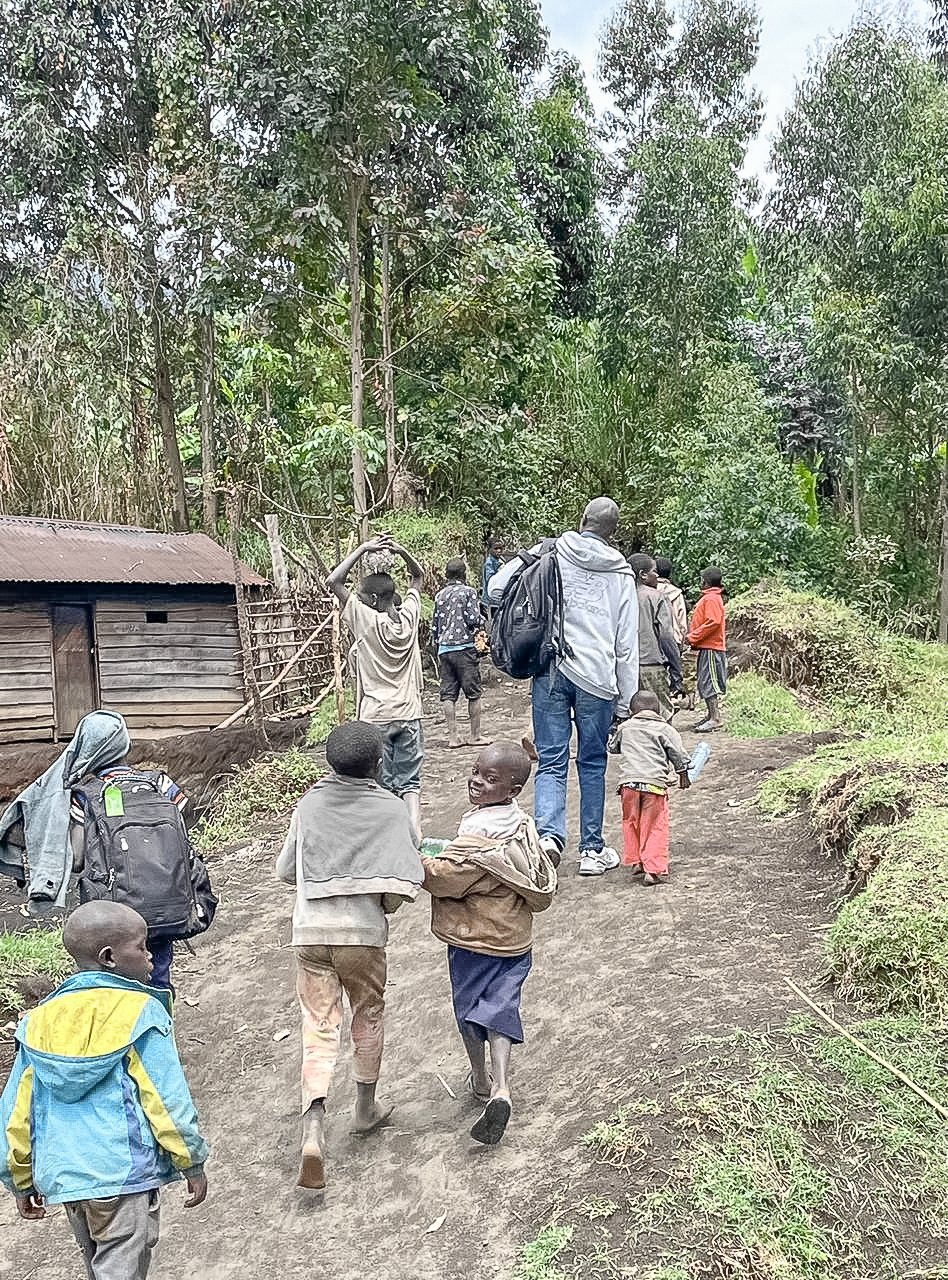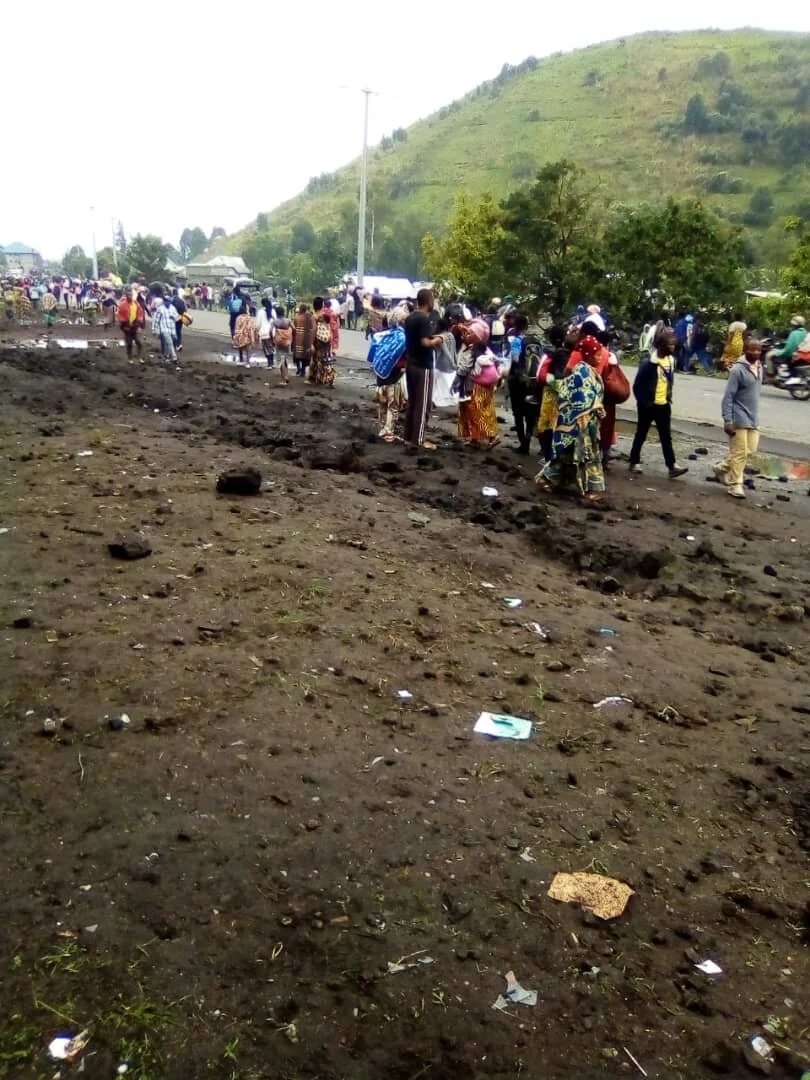The Story of Katembe Community
Goma is located in the north east of the Democratic Republic of Congo (DRC), bordering Rwanda. Goma is an area characterised by instability where armed groups have consistently launched attacks. Its recent history has been dominated by the Rwandan genocide in 1994, the aftermath of which saw a huge number of people fleeing and settling in the DRC, as well as the environmental destruction caused by an active volcano, Nyiragongo.
The majority of the people living around the villages of Goma are refugees from other communities who fled the ongoing armed conflict. Food security is a daily battle, made worse by recent droughts and food prices spiking in neighbouring East African countries. Families primarily feed themselves by growing their own food, however, people living as refugees have no access to land, and when they informally plant fields, the harvests are regularly raided by militias in the region. A large portion of the land, normally used for agriculture, cannot be used because of frequent volcanic activity. The gases released from the volcano are filled with unhealthy toxins, resulting in a growing number of illnesses. This is the region where the community of Katembe lies. In addition to these immense challenges, many people in Katembe believe in traditional healing and ancestral worship.
100 Children currently supported
11 Care Workers coordinated by Furaha
Basic Services Started in 2021
70 kM from the Likasi Local Office
The Hands at Work team in Goma weren’t necessarily searching for a new community to expand into, but God led them to the community of Katembe.
Between 2018 and 2019, the Goma team and other leaders were searching for Vumi, a young girl from the Luhonga community who had disappeared. She is one of the children who attends the Care Point there, so they wanted to find her and bring her home. Eventually, they had a lead about where she might be, and it was in a place that people said was unreachable. Taking Oliver, one of the Care Workers from Luhonga, the leaders climbed the steep and dangerous mountains, desperate to find Vumi and ensure she was safe and cared for. The community can’t be reached by car, and even by motorbike, it is a dangerous route that winds along the side of the mountain. One wrong turn and you would fall into the valley below.
Reaching the community, the team found Vumi and spent time encouraging her and sharing the word of God. As they were visiting, they could see the immense vulnerability in the area that was in desperate need and unreached by any other infrastructure or support services. Wanting to further understand the vulnerability in this area, the Goma team, as well as Erick (DRC leader) and George (Hands co-founder), visited again, but this time to the other side of the mountain, following the clear prompting of the Holy Spirit. On the other side of the mountain was Katembe. Upon reaching Katembe, they were introduced to the local chief, community and church leaders, who after hearing the vision of Hands at Work were willing to join in this work.
Through subsequent visits, the Goma team facilitated a meeting in a local church with people from the community, where they shared the heart and vision of Hands. From there, Care Workers were mobilised to care for the children. Over the next couple of months, the needs of the children were assessed and in November 2021, the Katembe Community Based Organisation was formed and began serving 30 of the most vulnerable children in their community - a number that has since increased to 100 children.
The Democratic Republic of Congo (DRC) has been plagued by decades of war. Hands at Work has been serving in DRC communities devastated by this unrest since 2006. The north-eastern province around the city of Goma has continued to experience the constant threat of rebel attacks and war. The level of violence has increased over the years, affecting communities where Hands at Work serves, resulting in children and their families having to flee their villages for their own safety. This escalating instability around Goma is highlighting the reality that families in the DRC face. They are fighting for their daily survival.
In late 2023, when rebels invaded Katembe, the people fled to a place called Sake. By February 2024, the entire Internal Displacement Camp had relocated and formed a new camp known as Sam-Sam. To continue caring for the most vulnerable children, a piece of land was secured on the edge of the camp, where a wooden house and fence were built, and a toilet was dug. This provides a safe space where children can receive two daily meals, offering some stability in a place marked by extreme suffering. To safeguard the property, Furaha’s husband stays there overnight. Though many simply long to return home after months of isolation and fear, the children and Care Workers have become a family. Each day, they eat and pray together, and the Care Workers continue to grow spiritually. As they come to know more about Jesus, hearts and minds are being transformed—a reason to praise Jesus even in the midst of such dire circumstances!
The local Hands at Work team in Goma currently supports three Community Based Organisations, which exist to care for the most vulnerable in their communities. The office provides training, networking, and encouragement to those Community Based Organisations like Katembe. It also gives administrative support, including helping with funding proposals, monitoring and evaluation, bookkeeping and reporting to donors.
BE INSPIRED BY UPDATES FROM Katembe COMMUNITY














Praise’s grandmother Bertha began caring for him, but she was desperately poor and trying to survive. Praise was hungry - continually crying. People in the community said he would die and tried to put ritual charms around him but Bertha refused and knew God would provide. After her husband passed away many years ago, she said she learned to trust God throughout any hardship.